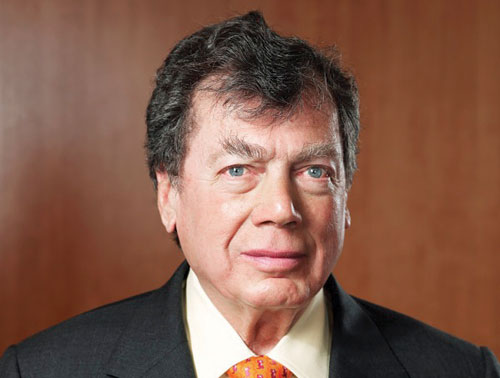.jpg)
New York—It was 1990, and in a place far away, in a beautiful city called Sarajevo, Bosnia-Herzogovina, civil war was raging and the city’s Jewish community was trapped between Christian and Muslim forces. In New York City, a World Jewish Congress meeting took place in the Seagram Building. Mega-philanthropist/Jewish activist Edgar Miles Bronfman, son of the legendary and aptly-named Sam Bronfman (bronfin is the Yiddish word for alcohol), and a formidable businessman, sat at the head of the U-shaped table.
On his right sat Gerhard Reigner, former secretary general of the WJC, and the man who, in 1942, sent a cable to Rabbi Stephen Wise in NY, warning about the imminent Holocaust. (“Received alarming report that in Fuhrers headquarters plan discussed and under consideration all Jews in countries occupied or controlled Germany number 3½ to 4 million should after deportation and concentration in East at one blow exterminated to resolve once and for all Jewish question in Europe.” He once said, “Never did I feel so strongly the sense of abandonment, powerlessness and loneliness as when I sent messages of disaster and horror to the free world and no one believed me.”)
To Bronfman’s right sat Rabbi Israel Singer, then WJC secretary general, a Torah Vodaas mesumach who grew up in Crown Heights and learned Daf Yomi with his boss daily. He was Bronfman’s right hand man in many ways, and the two were partners in shaking up the world. Around the table sat Jewish leaders from every continent on Earth. Among them sat the two Jewish leaders of Sarajevo—Ivica Ceresnjes and Yaakov Finci. They came to plead the case for the Jewish community, a neutral zone in a place where Muslims and Christians were shooting at each other, but not at the Jews. The Jewish Community Center was providing human services to both sides, but there was little food, water or electricity; people were dying because they couldn’t get their medications so Cerenjes and Finci came to New York to plead for help. Most Jewish organizations ignored them. Bronfman paid attention.
Bronfman and Singer took them to the White House to speak to President Bill Clinton, who listened carefully. At the time, his hands were tied because of international political protocols, but as soon as he could, Clinton and the late Secretary of State, Richard Holbrooke, ended genocide in the Balkans with an air war and the Dayton Accords.
Bronfman was fearless. He spoke truth to power to the Soviets, so that they would release Soviet Jewry; to the Israelis, who he sensed were falling too far to the right; to Jewish leaders who were neglecting young people—and he poured resources and brains into Hillel and the Bronfman Fellowships program to train future leaders who knew Judaism, who understood how the world worked. He also launched www.myjewishlearning.com, which gets a million hits a month. And while many Jews disagreed with Bronfman’s personal choices in life, no one could say he neglected Clal Yisroel in all its guises.
It was a 1970 trip to Russia that changed him. In one of his four autobiographies he wrote: “It was on those trips to Russia that my curiosity was piqued. What is it about Judaism, I asked myself that has kept it alive through so much adversity while so many other traditions have disappeared? Curiosity soon turned into something more, and that ‘something more’ has since turned into a lifelong passion.”
For many, Bronfman’s greatest accomplishment, after convincing the Kremlin to let the Jewish people go, was getting justice for the Holocaust survivors. With the `World Jewish Restitution Organization, he secured billions of dollars for Holocaust survivors and the agencies that serve them. Bronfman improved Jewish relations with the Vatican and convinced them to remove the convent at Auschwitz. And in 1991, while escorting President George Bush Sr. through a Tropicana orange grove, he convinced the President to get the UN to invalidate their resolution equating Zionism with racism.
His official bio says: “Among numerous honors conferred and leadership positions earned over the course of his life, Mr. Bronfman received the Presidential Medal of Freedom from President Clinton; the Chevalier de La Legion d’Honneur from the government of France; the Justice Louis D. Brandeis Award from the Zionist Organization of America; and honorary doctoral degrees from Williams College, McGill University, Tel Aviv University, New York University and Hebrew University, among others. He served as the founding chairman of the International Board of Governors of Hillel: The Foundation for Jewish Campus Life and chairman of the World Jewish Restitution Organization. He authored five books: The Making of A Jew, 1996; Good Spirits, 1998; The Third Act: Reinventing Yourself, 2002; Hope Not Fear: A Path to Jewish Renaissance, 2008; and The Bronfman Haggadah, 2013.
Without Edgar M. Bronfman’s generosity and leadership, the Jewish world today would not be as vibrant and strong as it is. He was unorthodox in many ways, but he was a powerful man who used his power wisely. A crown has fallen from our heads and his death is a great loss. May his memory be a blessing and an inspiration to future generations.
By Jeanette Friedman













